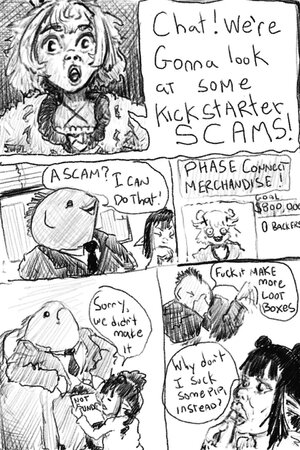"You little shit"Takanashi Kiara
You are using an out of date browser. It may not display this or other websites correctly.
You should upgrade or use an alternative browser.
You should upgrade or use an alternative browser.
Pippakistan's Psych Ward v3: Fosterhome For Aloggers (And Walmart Night Stockers)
- Thread starter thhrang
- Start date
- Status
- Not open for further replies.
just ban him alreadyThis thread is always so much better when Reticule doesn't show up. Interesting!
I only tell the truth.
That never happened, but he did call her a neko which could sound like a slur and get her channel in trouble.
I don't know what that means, I don't speak goy.
She cut it down so that there was less dead air and to enhance the viewing experience.
We need reticule if he ever goes away I might actually have to mind my mannersjust ban him already
He really is the "Oh, I can't say that but the jew can post this? " shieldWe need reticule if he ever goes away I might actually have to mind my manners

Who's gonna be responsible for the 'child entertainment'View attachment 87354
"Good Private Island"
Who's gonna be responsible for the 'child entertainment'
They say thank god for missouriHe really is the "Oh, I can't say that but the jew can post this? " shield
I say thank god for reticule
Realticule
I do it for the meats!
Early Adopter
I CAN STILL FIX HER
✡︎ God's Chosen Schizo ✡︎
Joined:
Sep 11, 2022
He really is the "Oh, I can't say that but the jew can post this? " shield
I think for games built around a single-player story it's fine to have a reasonable estimate on how long a typical run will take. The problem is that both developers and normalfag casual audiences convince themselves that a longer runtime = more value for money, so you end up with hours upon hours of mindless padding where the "gameplay" is just looking at the map and going to the waypoint to tick a box, then repeating that a hundred more times. It makes the initial run feel repetitive and makes the prospect of replaying the game at a later date less appealing, so over the course of a few years you actually spend less time playing the AAA twenty-hour game once than the replayable six-hour game several times.
Single-player story focused games are fine; the problem is they "evolved" into being movies that begrudgingly have a game in them. If they design it with the idea of a typical playtime, they failed to make a game.
A game is two things that feed into each other.
First, it is a challenge. If there is no challenge, it is not a game. This will of course vary, as something that is difficult for one person will be easy for another, but there will still be an objective level of difficulty. Well done, you will see something that beats the crap out of newcomers while offering a challenge to veterans. Bad games you see either it being unfair and frustrating for even the best players, or being piss easy for all.
(Shouldn't have to say this, but I mean a measurable challenge, not "oh this game challenged my perception of what it means to be-" fuck off into an active volcano you hipster fuck.)
Second, it is a puzzle. All games are, at their heart, a puzzle game. For literal puzzle games, that is obvious, but every genre - from Grand Strategy to Platformers to Real Time Strategy to First Person Shooters - are puzzles. Moment to moment you are taking in information and readjusting your planned actions to figure out what would be the next best move. In a multiplayer shooter, it's where you're at in a map, facing off against an enemy player, trying to predict their movements, while taking into account rate of fire, weapon types, and all sorts of things - a puzzle to solve every moment. If there is no puzzle to solve, it is not a game.
When I was younger and had a very limited budget for games, being worried about the playtime of a game made sense. Now I'm older and money isn't such a problem, I just want to have as much fun as I can with my limited gaming time and I don't care whether a game lasts five, fifty or five hundred hours. I'm definitely a lot less tolerant of game time padding than I used to be too.
Padding was a thing then and now. It was obvious in an NES game when shit was padded, and it was not a positive. Do agree my tolerance for it has degraded, but it was never a necessary thing. A tight game is a good game, whether you finish it in a few hours or a few hundred or thousand hours.
Last edited:
thhrang
Punished Autism Extraordinaire
Early Adopter
Ward Security
♥Realticule's Husbando♥
Joined:
Sep 13, 2022
Yeah, mepipupper is alive
Her parents have dogs too.pipupper is alive
that legit sounded like pipupper to me.Her parents have dogs too.
Did thhrang just claim to be Pippa's dog?Yeah, me

Two I think right? The Ukrainian one her dad got and one of her moms?Her parents have dogs too.
thhrang
Punished Autism Extraordinaire
Early Adopter
Ward Security
♥Realticule's Husbando♥
Joined:
Sep 13, 2022
Should be easy to solve then, just compare bark with previous barks to confirmHer parents have dogs too.
- Status
- Not open for further replies.




